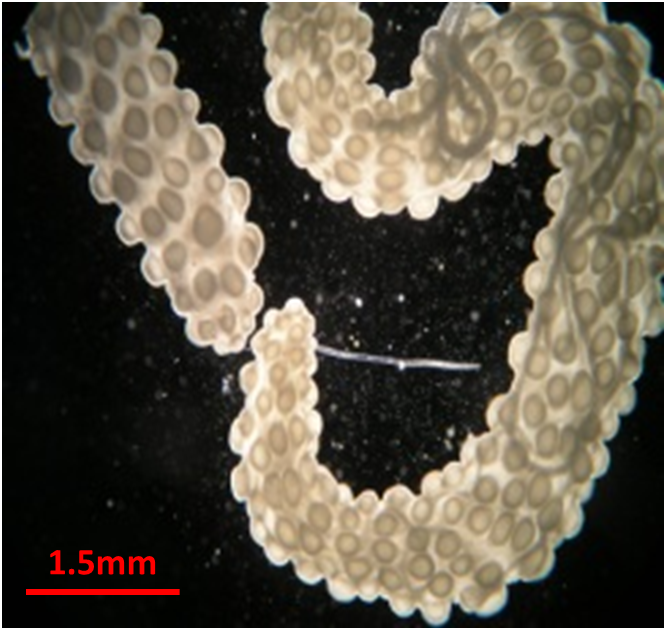
Bee populations are in severe decline, an alarming and worrying trend when you consider their vital importance as commercial and ecological pollinators. Research and media attention often focuses on afflictions of honeybees such as the Varroa mite and colony collapse disorder. However, parasites are also major contributors to the plight of the bumble bee.
Bumble bee queens spend 6-9 months in diapause, a hibernation-like state which allows them to survive harsh winter weather. My research demonstrated that queens have reduced immune function during this time, leaving them vulnerable to infections and parasitic attack.
Sphaerularia bombi is a common yet poorly studied nematode which is found primarily in the Northern hemisphere, infecting up to 50% of queen bumble bees in some areas. Adult female Sphaerularia present in the soil infect diapausing queens. My project showed that, with their immunological guards down, the queens cannot mount an effective response to invading parasites.
Sphaerularia exerts significant influence on its host after the queens emerge from diapause. The nematodes evert their uterus to a structure 300 times the volume of the rest of their body (see picture above). This enormous uterus releases numerous eggs into the host and also extracts nutrients from the bees.
Sphaerularia castrate the queens so they don’t form new colonies. The parasite also changes queens’ behaviour so they go to sites suitable for diapause even though it’s the wrong time of year. Having released larval stage nematodes into the soil, parasitised queens die while the nematodes are then poised to infect new queens entering diapause.
Sphaerularia clearly has a significant impact on a host species with high ecological and commercial value yet it remains very poorly studied. In collaboration with research currently being performed by PhD student Joe Colgan (Trinity College Dublin: Supervisor Dr. Mark Brown) and Dr. Jim Carolan (National University of Ireland, Maynooth), my project filled some of the gaps in our understanding of the molecular interactions between host and parasite. One particularly interesting finding was that S.bombi infection seems to change the protein expression in bees, indicating a complex interaction between host and parasite at the molecular level in parallel to the dramatic physiological and behavioural changes in the bees.
Continuation of this research on a fascinating host-parasite system will bring us closer to understanding and hopefully eventually combatting the plight of the bumble bee.
References
1. Society of Biology News Page http://www.societyofbiology.org/newsandevents/news/view/469
Author
Sive Finlay: sfinlay[at]tcd.ie
Photo credit
Mike Kelly

